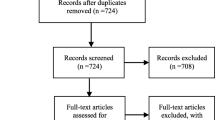Abstract
Objective
Despite the acknowledged importance of ethics education in medical school, little empirical work has been done to assess the needs and preferences of medical students regarding ethics curricula.
Methods
Eighty-three medical students at the University of New Mexico participated in a self-administered written survey including 41 scaled questions regarding attitudes, needs, and preferences toward medical ethics and ethics education.
Results
Students reported strong personal interest in learning more about ethics in clinical medicine and research. They most strongly endorsed as valid objectives of ethics education the goals of helping professionals “better recognize ethical issues and clarify values-laden choices,” “improve patient care and clinical decision-making,” and “improve ethical practices in clinical research.” Participants strongly agreed that “professional attitudes and values are an appropriate focus for medical education” and also expressed strong interest in learning more about specific ethical topics and learning methods. Women more strongly endorsed interest in additional ethics education and a preference for increased ethics education than men. Preclinical participants expressed a greater desire for additional training on all ethics topics than clinical students.
Conclusion
The medical students surveyed strongly affirmed ethics education in medical school and expressed clear preferences for curricular topics and teaching methods.
Similar content being viewed by others
References
Holm S, Nielsen GH, Norup M et al: Changes in moral reasoning and the teaching of medical ethics. Med Educ 1995; 29: 420–423
Lane LW: Residency ethics training in the United States: special considerations and early experience, in Medical Ethics for Postgraduate Medical Students, Symposium’ 90. Proceedings. London, Canada, Westminster Institute for Ethics and Human Values, 1990, pp 21–32
Wong J, Cheung E: Ethics assessment in medical students. Med Teach 2003; 25: 5–8
Roberts LW, Green Hammond KA, Geppert CM, et al: The positive role of professionalism and ethics training in medical education: a comparison of medical student and resident perspectives. Acad Psychiatry 2004; 28: 170–182
Shelp EE, Russell ML, Grose NP: Students’ attitudes to ethics in the medical school curriculum. J Med Ethics 1981; 7: 70–73
Olukoya AA: Attitudes of medical students to medical ethics in their curriculum. Med Educ 1983; 17: 83–86
Roberts LW, Warner TD, Green Hammond KA, et al: Teaching medical students to discern ethical problems in human clinical research studies. Acad Med 2005; 80: 925–930
Roberts LW, Warner TD, Dunn LB, et al: Shaping medical students’ attitudes towards ethically important aspects of clinical research: results of a randomized, controlled educational intervention. Ethics Behav 2007; 17: 19–50
Price J, Price D, Williams G, et al: Changes in medical student attitudes as they progress through a medical course. J Med Ethics 1998; 24: 110–117
Hoop JG: Hidden ethical dilemmas in psychiatric residency training: the psychiatry resident as dual agent. Acad Psychiatry 2004; 28: 183–189
Self DJ, Schrader DE, Baldwin DC Jr, et al: The moral development of medical students: a pilot study of the possible influence of medical education. Med Educ 1993; 27: 26–34
Wolf TM, Balson PM, Faucett JM, et al: A retrospective study of attitude change during medical education. Med Educ 1989; 23: 19–23
Feudtner C, Christakis DA: Making the rounds: the ethical development of medical students in the context of clinical rotations. Hastings Cent Rep 1994; 24: 6–12
Author information
Authors and Affiliations
Corresponding author
Additional information
The authors wish to thank Ann Tennier, ELS, for her assistance in the preparation of this manuscript. This study was funded by the National Institute of Mental Health and the National Institute on Drug Abuse. Drs. Hoop, Roberts, and Ms. Tennier are also funded through the Research for a Healthier Tomorrow-Program Development Fund, a component of the Advancing a Healthier Wisconsin endowment at the Medical College of Wisconsin.
At the time of submission, Drs. Lehrmann, Hoop, and Green Hammond declared no competing interests. Disclosures of Academic Psychiatry editors are published in each January issue. Manuscripts authored by an editor of Academic Psychiatry or by a member of its editorial board undergo the same editorial review process, including blinded peer review, applied to all manuscripts. Additionally, the Editor is recused from any editorial decision making.
Rights and permissions
About this article
Cite this article
Lehrmann, J.A., Hoop, J., Hammond, K.G. et al. Medical Students’ Affirmation of Ethics Education. Acad Psychiatry 33, 470–477 (2009). https://doi.org/10.1176/appi.ap.33.6.470
Received:
Revised:
Accepted:
Published:
Issue Date:
DOI: https://doi.org/10.1176/appi.ap.33.6.470




